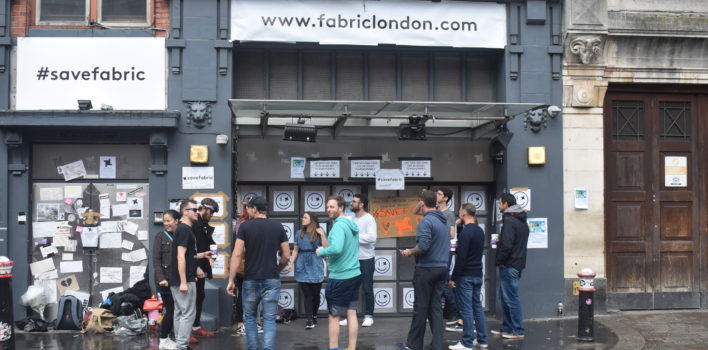Footloose 2016 – How #SaveFabric’s Dance Protest Became “Bigger Than Anticipated”
In our latest feature, Nicolo Gervasi discusses with organiser Tim Griffith, attendees and more how a 24-hour dance protest in Islington helped further the campaign to #SaveFabric, as well as the legal battles which lie ahead…

A group of campaigners held a 24-hour dance marathon outside Fabric nightclub in Islington to support the venue in the ongoing legal battle for its license, which is set to reach court late next month. The inventive fundraiser, which began at noon on Friday October 7, was organised by DJ and music producer Tim Griffith and was promoted with the hashtag #Fabricfootwork.
The doors of Fabric have remained closed since last month, when Islington Council revoked the club’s license following the drug-related deaths of two teenagers. Covered with #SaveFabric banners and messages of support from its regulars, the walls of the venue offered an appropriate backdrop for the dance protest.
Although 400 people had confirmed their attendance on Facebook, Tim was not expecting the event to prove as successful as it turned out to be. He says: “I think the protest went well. I achieved what I set out to achieve and, actually, I think the exposure and reach that was generated was bigger than I anticipated, both online and on the street.”
Tim, who is passionate about UK club culture, was looking for a more active way to get involved in the #SaveFabric campaign than a simple donation. “I remember thinking to myself, what can I do? I didn’t just want to throw money at the problem and hope it would go away. I wanted to stand up and fight for it, so I did.”

Since its launch on September 30, Fabric’s online fundraising initiative has raised over £300,000, with the recent 24-hour dance event adding a further £1,645 to this total. All the proceeds will help cover the extensive legal fees which the club requires to appeal the revocation of its license on November 28 at the Highbury Magistrates Court.
A continuous rotation of supporters danced alongside Tim throughout the event, which reached around 40 simultaneous participants at its busiest moment. He says this was just the right number of attendees, since he feared that if more supporters had shown up, local police might have intervened.
Despite concerns that the fundraiser might attract unsolicited illegal activity, the event ran undisturbed from start to finish. Tim said: “There was absolutely no trouble at all. In fact, the amount of people who stopped by to have a dance, and then stayed for five or six hours was unbelievable.
“I have never encountered so much love and support from complete strangers. This is exactly the kind of humbling nature that our scene is full of, yet so few have their eyes open enough to see it.”
As the fresh-faced Friday afternoon crowd slowly evolved into the sleep-deprived, more intimate circle still standing outside the club on Saturday morning, Tim remained there, striving to get to the finish line, his tired eyes shielded by sunglasses.
Restaurants in the area came to Tim’s rescue by giving him food and letting him use their facilities. He later took to Facebook to thank Smith’s Restaurant for their help, along with everyone else that shared, supported and attended the event.
Judging by Tim’s efforts to save the club, the fact he never actually set foot into Fabric might come as a surprise. Of this revelation, he says: “Some people were so shocked when I told them this, others not so much, because they could see the bigger picture.” Indeed, although Fabric was the focus of the fundraiser, those who took part shared a wider goal involving London’s nightlife as a whole.
Siobhan Malik, a friend of Tim’s, reveals that she has been witnessing the closure of nightlife venues throughout her life, ever since a young age. She says: “I met the majority of my closest friends through clubbing. We used to go to Turnmills, just up the road, a phenomenal club which has also been closed.”
Yanta wishes her eighteen-year-old daughter could enjoy a night out at Fabric just like previous generations such as Siobhan’s once did. “She is so sad that she won’t experience it,” Yanta says, “She’s actually asked me to stop talking about how good it was. Let’s hope she and Tim get to go one day – it would be the most epic party.”

Campaigners who shared the same sentiment as Yanta even launched the hashtag #GetTimIn, expressing their hopes that the recent license revocation does not necessarily mark the end of the event organiser’s chances to experience the venue’s nightlife first-hand.
Tim, however, was fighting for more than just access to a club. When asked about the values behind his campaigning, he said: “Club culture represents many things: art, expression, freedom. It’s a break from social expectation. In my opinion, the most important aspect of UK club culture is community.
“The people we meet through these circles, the love forged in the heat of a packed dance floor, the relationships built over trust, common ground and shared passions at clubs, after parties and festivals around the country, or even the world. They’re all crucial aspects of UK club culture.
“Within two hours of my dance protest outside Fabric, I met a man, who met his partner on the dancefloor of a club. They are now married and have a child.”
“I would obviously love for Fabric to win their appeal, I’m leaning that way more than the other, but if they lost it, for good, I wouldn’t be surprised. You only have to look at the decline of some of London’s most treasured clubs over the past decade. The stats are staggering.”
Then again, did any of those clubs hold a 24-hour dance fundraiser?




